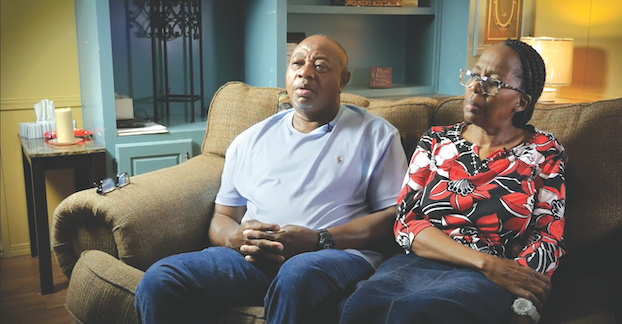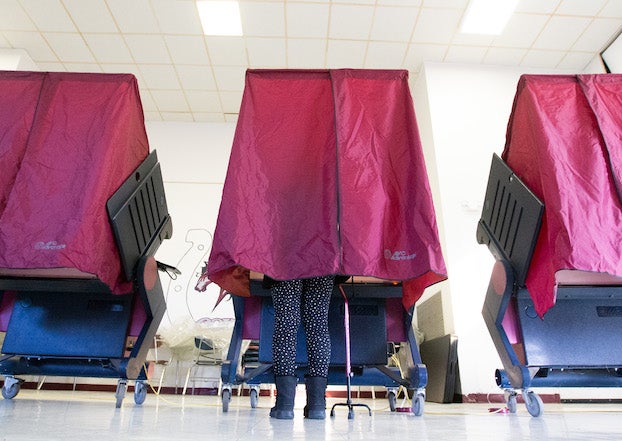Case of Woodrow Karey, who shot pastor during revival in 2013, remembered by attorney
Published 6:23 am Wednesday, November 29, 2023

- The YouTube documentary "“A Force for Freedom, the Untold Story of the Woodrow Karey Case,” includes interviews with Woodrow Karey and his wife, Janet. (Special to the American Press)
On Sept. 27, 2013, Woodrow Karey walked into Tabernacle of Praise Worship Center and fatally shot his pastor in front of 65 congregants. Tried for manslaughter in 2018, the jury found him not guilty.
Ten years after that historic case — including a fight to the Supreme Court to gain Karey’s freedom after a week-long trial — defense lawyer Adam Johnson said faith is what guided Karey, his family and everyone who worked on the defense team and is what led to the acquittal.
“The Woodrow Karey case, in my opinion, was a modern-day Daniel in the Lions Den miracle,” Johnson told members of the Kiwanis Club of Downtown Lake Charles on Tuesday. “No one had more stacked against him than Woodrow. He walked into a church with a 12-gauge shotgun and in front of 65 people in the middle of a revival service on a Friday night, he shot the pastor in front of those witnesses from a distance and then walked up to him and fired a combination shot. Then he immediately left the church and called 911 and said, ‘I did it. You’re looking for me,’ which confused the dispatcher because that’s not usually how it goes.”
Johnson said Karey then calmly directed officers to where he was located.
“Woody did serve time in jail because his bond was so high but you can imagine, from the inmate side of it, that there wasn’t anybody else in there with a worst set of facts,” Johnson said. “What we saw play out over a period of time was a rescue story.”
Prior to the shooting, Karey was employed at CenterPoint Energy for 30 years and was a deacon at Tabernacle of Praise.
“When I say deacon of the church, he did everything,” Johnson said. “If there was a plumbing problem, you called Woody. If the church needed help raising money, you called Woody. If the pastor’s plumbing had a problem, you called Woody. He mowed the grass and he didn’t charge the church, he just mowed their grass every single Sunday.”
Johnson said Woody had been the church’s reliable go-to congregant the 15 years Harris served as pastor and years before that.
“When Pastor Harris came to Lake Charles, the church had about 750 people,” Johnson said. “On the night he was shot, there was 65 people in the church and those 65 people included people from other churches. The church itself had dramatically dwindled during his time there.”
Johnson said Karey is an “unquestionable man of faith.”
“When I would go visit him in jail,” Johnson said, his voice quivering, “he would minister to me. Whenever he was in jail, he would run a Bible study in the morning and he ran a Bible study in the afternoon, some of which were attended by Calcasieu Parish Sheriff’s Office deputies.”
Johnson said two of those deputies were willing to testify as character witnesses on Karey’s behalf.
The night of the shooting, Karey’s family called Johnson’s father, Terry — founder of the Johnson Law Firm — for help.
“Woodrow is married to Janet Karey and Janet Karey’s mother was my nanny,” Johnson said. “She helped raise me and my three siblings and my dad was the closest family lawyer they knew so on the night all this happened, Janet called my father, who was no longer practicing criminal law, and my dad passed me the phone and said, ‘I don’t know what you’re going to be able to do to help him.’ I immediately got in my car, flew out to the jail and I remember telling my wife as I walked out the door, ‘Dad says we’re not going to be able to do anything for him, but just wait and see.’ ”
Johnson said when he arrived at the correctional center, he told the deputies they were holding his client and he didn’t want any further questions asked of him.
“We’d later come to know that, if you watch the video of his statement — which just shows the entire time he was in God’s hands — Woodrow on video is being questioned by detectives and he says, ‘You know, I think I might need to talk to a lawyer’ and at that immediate point as he finishes the word ‘lawyer’ a detective walks into the room and says, “There’s an Adam Johnson here that would like to speak with you. Would you like to talk to him?’ and he says, ‘Yes, sir, I’d like to talk to him.’ The only thing he said on video before that time was (Harris) ‘raped my wife.’ That’s the only thing they had and that’s the only thing he told dispatchers.”
Johnson said the week before the shooting, Karey’s wife was upgrading her cell phone and for about a six- to seven-minute period, phone lines were switched in their family plan as information was being taken from her old phone and retransmitted to the new phone.
“Woody’s in his living room, he’s got his granddaughter on his chest and he’s watching football with his son,” Johnson said. “It’s a great time for them, it’s super relaxing. He started receiving text messages that were not designed for him, but for his wife. He receives a text message on his phone and that text message is from Pastor Harris and it is calling his wife every name in the book. He says, ‘You’re just a piece of meat;’ it’s not pastor talk.”
Johnson said when Karey’s wife returned home, Karey asked her about the texts.
“She said, ‘I am so glad I have to finally deal with this,’ and explains to him that for the past 14 years, since he had been a pastor there, he had been following her and assaulting her,” Johnson said.
Johnson said Harris had sent texts to Karey’s wife saying “you and your family will suffer” and was “an ever-present threat” to the family.
He said Harris was able to continually assault her over that 14-year period because of the powerful position he held over his congregants — and she isn’t the only woman who has accused Harris of abuse.
Johnson said the couple reported the rapes to police and, out of fear of Harris retaliating against Janet or confronting her, Woodrow followed his wife to work every day, making sure she wasn’t being followed.
“The officer who they reported it to runs the Iowa Law Enforcement Center and he testified for us at trial,” Johnson said. “I asked him, ‘Do you believe his wife was being raped,’ and he said, ‘I don’t know if his wife was being raped, but I believe he believes that.’ ”
Karey also went to his doctor and confided in him prior to the shooting that his wife had been raped and the doctor’s notes were read at trial.
“It was well known that Harris’ daughter worked at the DA’s office at the time and that he had some political influence so he had been telling (Janet) for years, ‘Don’t ever tell anyone. Don’t ever think you’re going to get me in any trouble because I have too much power.’ ”
Johnson said when Karey called to ask about the case the Thursday before the shooting, he was told a detective hadn’t been assigned to the case yet, “which in his mind meant nothing is going to be done about this. Was that premature? Yes. With the knowledge of the system and how quick they are to assign detectives was that premature? Yes.”
Johnson said despite the discouragement, Karey held prayer meetings every day that week at the church.
“That was Woody’s refuge,” he said. “All during this time, he’s running to his faith. He’s not running away from it, he’s running toward his faith.”
The day of the shooting, Johnson said Karey asked his wife if she had ever been assaulted by Harris in their home. Her answer was yes.
“He said, ‘Look, I just have to go get some air,’ ” Johnson said. “He gets in his car and he’s driving around and he’s looking at a rape pamphlet he was given that describes what a husband should do in situations where someone has been sexually assaulted. He drives around and he finds himself outside the church and he looks through the doors and he sees the pastor dancing on stage in front of the congregation and in Woodrow’s words, ‘I saw him doing what he’d been doing. Not changing. I found myself in the church and I walked in and I shot the pastor.’
Johnson said during trial preparation, once the decision was made that Karey was going to testify in self-defense, he asked him what he would say if the prosecutor asked him about the children in the audience there that night and what they must have gone through.
“Woodrow said, ‘If I had made eye contact with one of those children, I would have dropped that gun and ran out of there,’ ” Johnson said. “You tell me, can you think of a better answer to that question on the spot? I couldn’t.”
Johnson said the week before jury selection was to begin, daily prayer meetings were held at their law firm.
“We prayed specifically that God would use the prosecution to benefit our case, that we wanted the courtroom not to feel like a courtroom and that jurors wouldn’t feel the stress of the courtroom but would feel at home. And we asked for specific signs along the way that God was with us.”
He said they ultimately found those signs in the prosecution’s lack of filing a motion for discovery from the defense prior to trial.
“We asked to subpoena 120 witnesses, we clearly had some evidence,” Johnson said. “We had evidence that the pastor had previously been accused of sexual assault in the Pentecostal church and the reason the church was switched from Calvary Pentecostal to Tabernacle of Praise was so that the investigation could be dumped because he was no longer a due-paying member of the Pentecostal church so they lost jurisdiction over investigating him. We called the people from that hearing and the state never asked for that.”
Johnson said there were several “raise-the-hair-on-the-back-of-your-neck” moments during the trial that showed God was with them, including during jury selection when the defense was able to show the prosecution was continually excusing Black people as potential jurors.
He said when the verdict was read and the angry chants were heard outside the courtroom, what their defense team saw and what the Karey family saw was “one of the greatest witnessing, faith events I’ve ever seen in my life.”
“There was nobody in more trouble than Woodrow and those inmates saw him running toward his faith and casting his cares on Christ and what they saw was Daniel being removed from the lion’s den,” Johnson said. “That was a witness event to every single person in that jail, that they had not been forgotten, that they had not been forsaken, that God was their refuge.”





